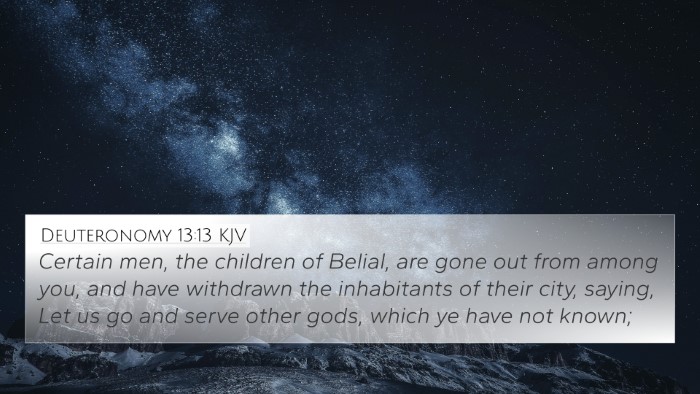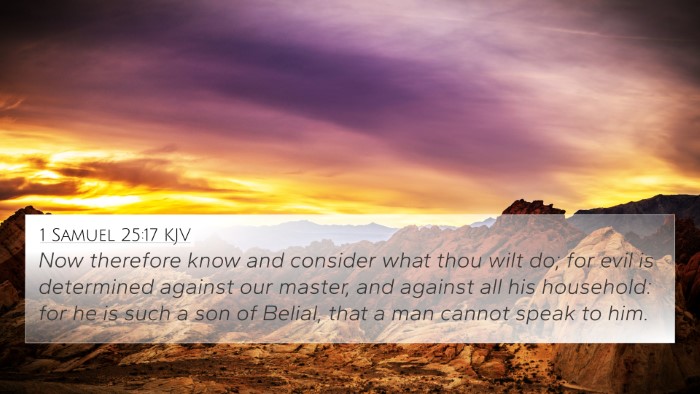Understanding 1 Samuel 30:22
Bible Verse: 1 Samuel 30:22
"Then answered all the wicked men and base fellows of those that went with David, and said, Because they went not with us, we will not give them ought of the spoil that we have recovered: save to every man his wife and children, that they may lead them away, and depart."
Summary of Meaning
This verse captures a moment in David’s saga where he confronted the men's base response to the recovery of their families and possessions. The harsh treatment towards those who did not join in the battle reflects human nature's inclination towards greed and divisiveness. Notably, this moment calls attention to loyalty, justice, and the often tribal mentality that emerges during times of conflict.
Insights from Commentaries
Matthew Henry's Commentary
Henry elaborates on the hardness of heart displayed by these men towards their fellow comrades. He emphasizes that the sense of entitlement and disregard for their brethren undermines the spirit of unity and cooperation that should exist among the faithful in times of crisis. This verse serves as a caution against selfishness and shows the importance of collective effort in both successes and hardships.
Albert Barnes' Notes
Barnes points out the social and moral implications of this behavior. He suggests that the division and discord among David's men illustrate a broader theme of conflict arising from personal grievances during communal achievements. The verse underlines the necessity for leaders like David to address these dissenting voices to maintain harmony and ensure fairness in distribution among those who have fought and those who have remained behind.
Adam Clarke's Commentary
Clarke delves into the implications of this division further, interpreting the response of the wicked men as an example of ingratitude. He also relates this scenario to the biblical values of charity and the need to uplift one another. Clarke stresses the importance of acknowledging all contributions, regardless of visibility or outward success, fostering unity in the community.
Related Bible Cross-References
- 1 Timothy 6:10 - "For the love of money is the root of all evil..." - it relates to the greed displayed by David’s men.
- James 4:1-2 - "From whence come wars and fightings among you? Come they not hence..." - highlights the conflict arising from desires.
- Luke 6:31 - "And as ye would that men should do to you, do ye also to them likewise." - calls for mutual respect and kindness.
- The Song of Solomon 8:6 - "For love is strong as death..." - emphasizes loyalty, reflecting on love’s enduring nature which contrasts with the betrayal in 1 Samuel 30:22.
- Philippians 2:3-4 - "Let nothing be done through strife or vainglory..." - promotes unity and humility, contrasting with the self-centeredness shown.
- Galatians 6:2 - "Bear ye one another's burdens, and so fulfill the law of Christ." - emphasizes support within the community.
- Matthew 25:40 - "Inasmuch as ye have done it unto one of the least of these my brethren, ye have done it unto me." - advocates for the care for all, not just the strong.
Thematic Connections in Scripture
This verse serves as a focal point for discussing themes like unity versus division, loyalty, and the moral responsibility of individuals within a community. These themes are recurrent throughout scripture:
- Selfishness versus altruism is a central biblical message, echoed in the teachings of Jesus.
- Community dynamics—especially regarding leadership and responsibility—are explored through the narratives of both the Old and New Testaments.
- The folly of neglecting one’s neighbors for self-gain is warned against in numerous scriptures, reinforcing the principle of care for one another.
Conclusion
1 Samuel 30:22 not only portrays a situation of conflict and selfishness among David’s men but also highlights broader themes applicable to Christian life today. The interpretations from various commentaries reveal that unity, shared responsibility, and mutual respect are imperative for any community, especially a faith-based one. Engaging with the scripture through a comprehensive cross-referencing approach enhances understanding of the interconnectedness of biblical texts, illustrating the ongoing dialogue across the scriptures and their relevance to modern believers.










